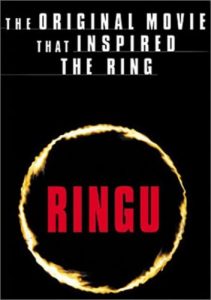 A thing I had never gotten around to watching is the Japanese movie that inspired The Ring. I was pretty much saving it, maybe for a marathon? I don’t know. See, I’ve got this box filled with horror movies on DVD that I collected over the course of the Oughts, and for a good chunk of that time it sat in my car so I’d have it with me when I went places. Mostly the only person who would put up with the kinds of movies that went into the box was my oldest friend, Jeff. So, occasionally movies would be watched (Mulva: Zombie Ass-Kicker, anyone?) and removed from the box, only to be replaced by others. And then I managed to lose the box for most of a decade, as a consequence of a move in late 2006. (Or I lost it later than that in my garage of doom, because of all the other boxes that really did languish there for most of said decade? Either way.)
A thing I had never gotten around to watching is the Japanese movie that inspired The Ring. I was pretty much saving it, maybe for a marathon? I don’t know. See, I’ve got this box filled with horror movies on DVD that I collected over the course of the Oughts, and for a good chunk of that time it sat in my car so I’d have it with me when I went places. Mostly the only person who would put up with the kinds of movies that went into the box was my oldest friend, Jeff. So, occasionally movies would be watched (Mulva: Zombie Ass-Kicker, anyone?) and removed from the box, only to be replaced by others. And then I managed to lose the box for most of a decade, as a consequence of a move in late 2006. (Or I lost it later than that in my garage of doom, because of all the other boxes that really did languish there for most of said decade? Either way.)
But I found it during last year’s move, hooray! Only, most of the time since then, Jeff was in and out of hospital rooms until, y’know, he stopped being in and out of hospitals, so the box has languished in a storage closet once again, Ringu and its many sequels (not to mention dozens of other, mostly worse movies) still unwatched. But for some reason, I thought of it after we watched As Above, So Below last weekend, and we made a double feature of it.
Anyway, it was pretty much exactly the same as my memory of The Ring, so there’s not a lot to say in terms of review. In case you don’t know, there’s a VHS tape that, when you watch it, you die seven days later. And nobody knows why! I could digress on the laughability of VHS being applicable to modern life, but a) I’ve done this before, b) the movie is nearly 20 years old, and mostly c) my heart’s just not in it. Too busy being sad about how full the horror movie box is, and how long it sat there, thinking it had all the time in the world.
 Perhaps it’s because I’ve been playing Rise of the Tomb Raider[1], but
Perhaps it’s because I’ve been playing Rise of the Tomb Raider[1], but 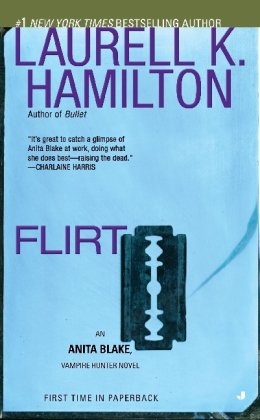 Three years between Anita Blake books this time. Oops, I guess? I should read things I like next, clearly. Anyway,
Three years between Anita Blake books this time. Oops, I guess? I should read things I like next, clearly. Anyway, 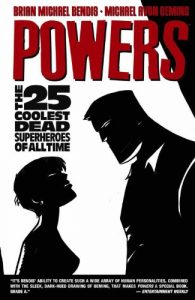 The last Powers book
The last Powers book At long last, I’ve played another Assassin’s Creed game. I must be at least four behind now? And at some point they get terrible, though I do not know what point that is. Anyway,
At long last, I’ve played another Assassin’s Creed game. I must be at least four behind now? And at some point they get terrible, though I do not know what point that is. Anyway, 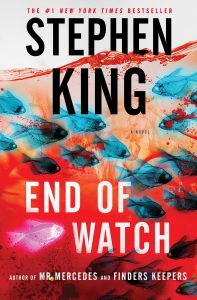 There was a time when I claimed that
There was a time when I claimed that 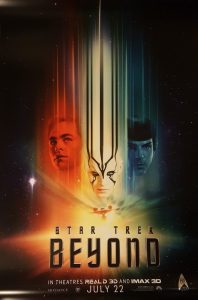 First of all, it’s weird that “Star Trek” has turned into an imperative verb in the new movie series. I mean, it is, right? Who is being commanded? I guess probably Kirk. (I reject the idea that the audience is the object.) And that established,
First of all, it’s weird that “Star Trek” has turned into an imperative verb in the new movie series. I mean, it is, right? Who is being commanded? I guess probably Kirk. (I reject the idea that the audience is the object.) And that established, 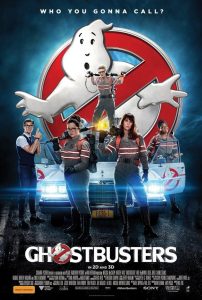 I actually saw two movies on Thursday prior to departing for a camping trip. As usual, I have squandered my chance at a timely review of a new release movie. This happens with such reliability that this can probably never be my actual job? No, I’m kidding, there are much better reasons for that outcome than lack of timeliness. Still, though, I’m here now, so let’s talk.
I actually saw two movies on Thursday prior to departing for a camping trip. As usual, I have squandered my chance at a timely review of a new release movie. This happens with such reliability that this can probably never be my actual job? No, I’m kidding, there are much better reasons for that outcome than lack of timeliness. Still, though, I’m here now, so let’s talk.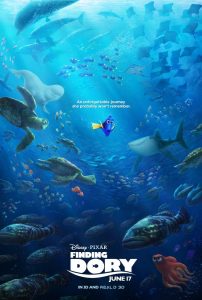 Remember
Remember 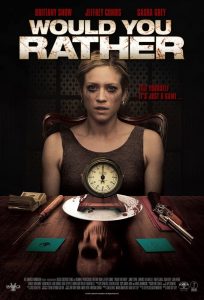 The difference between rich people and poor people, in a nutshell, is this: if you are rich, you can spend your money any way you want to. You can hire personal painters or musicians under the patronage system, or you can make bums fight on camera, or you can throw elaborate annual dinner parties for groups of strangers, where eventually they will play a high-stakes children’s game for your amusement. If you are poor, you can hope you find the rich person who wants to improve the atmosphere of the world to be your patron, but most likely you’ll only find the other rich people instead. Good luck!
The difference between rich people and poor people, in a nutshell, is this: if you are rich, you can spend your money any way you want to. You can hire personal painters or musicians under the patronage system, or you can make bums fight on camera, or you can throw elaborate annual dinner parties for groups of strangers, where eventually they will play a high-stakes children’s game for your amusement. If you are poor, you can hope you find the rich person who wants to improve the atmosphere of the world to be your patron, but most likely you’ll only find the other rich people instead. Good luck!